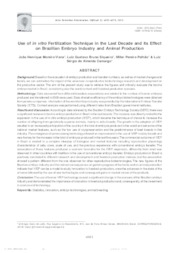Use of in vitro fertilization technique in the last decade and its effect on Brazilian embryo industry and animal production.
Use of in vitro fertilization technique in the last decade and its effect on Brazilian embryo industry and animal production.
Resumo: BACKGROUND - Based on the evaluation of embryo production and transfer numbers, as well as of market changes and trends, we can estimative the impact of the advances in reproductive biotechnology research and development on the productive sector. The aim of the present study was to retrieve the figures and critically evaluate the bovine embryo market in Brazil, considering also the world context and livestock production scenario. METODOLOGY - Data recovered from different breeders associations and related to the number of bovine embryos produced and transferred in 2009 were used. Data of relative efficiency of the embryo biotechnologies were obtained from private companies. Information of the world embryo industry was provided by the International Embryo Transfer Society (IETS). Context analysis was performed using different index from Brazilian government institutes. RESULTS AND DISCUSSION - According to data retrieved by the Brazilian Embryo Technology Society (SBTE) there was a significant increase in bovine embryo production in Brazil in the last decade. This increase was directly related to the expansion in the use of in vitro embryo production (IVEP), which became the technique of choice to increase the number of offspring from genetically superior animals, mainly in zebu breeds. The growth in the adoption of IVEP resulted in an increased participation of the country in the total of embryos produced in the world and set some of the national market features, such as the low use of cryopreservation and the predominance of beef breeds in this industry. The emergence of semen sexing technology allowed an improvement in the use of IVEP in dairy breeds and was the key for the increase in the total of embryos produced in the last five years. The commercial outcome of IVEP in Brazil is related to a complex interplay of biological and market features including reproductive physiology characteristics of zebu cows, scale of use, and the previous experience with conventional embryo transfer. The association of these features produced a scenario favorable for the IVEP expansion, differently from what was observed in other countries with tradition in the use of conventional embryo transfer. Embryo production in Brazil is positively correlated to different research and development and livestock production indexes, but the association showed a pattern different from the one observed for other reproductive biotechnologies. The new figures of the Brazilian embryo industry and the indirect consequences on genetic progress of the herds and on animal production indicate that IVEP can be a model to study innovation in livestock production, once the advances in the state of the art were followed by the use of new technologies and consequent gains in market values of the products. CONCLUSION - The use of bovine IVEP technology caused a significant change in the scenario of the Brazilian embryo industry and demonstrated the importance of innovation in livestock production and, consequently, of the investment in science and technology.
Ano de publicação: 2010
Tipo de publicação: Artigo em anais e proceedings
Unidade: Embrapa Gado de Leite
Observações
1 - Por padrão são exibidas publicações dos últimos 20 anos. Para encontrar publicações mais antigas, configure o filtro ano de publicação, colocando o ano a partir do qual você deseja encontrar publicações. O filtro está na coluna da esquerda na busca acima.
2 - Para ler algumas publicações da Embrapa (apenas as que estão em formato ePub), é necessário ter, no celular ou computador, um desses softwares gratuitos. Sistemas Android: Google Play Livros; IOS: iBooks; Windows e Linux: software Calibre.
Acesse outras publicações
Acesse a Base de Dados da Pesquisa Agropecuária (BDPA) para consultar o acervo completo das bibliotecas da Embrapa.

